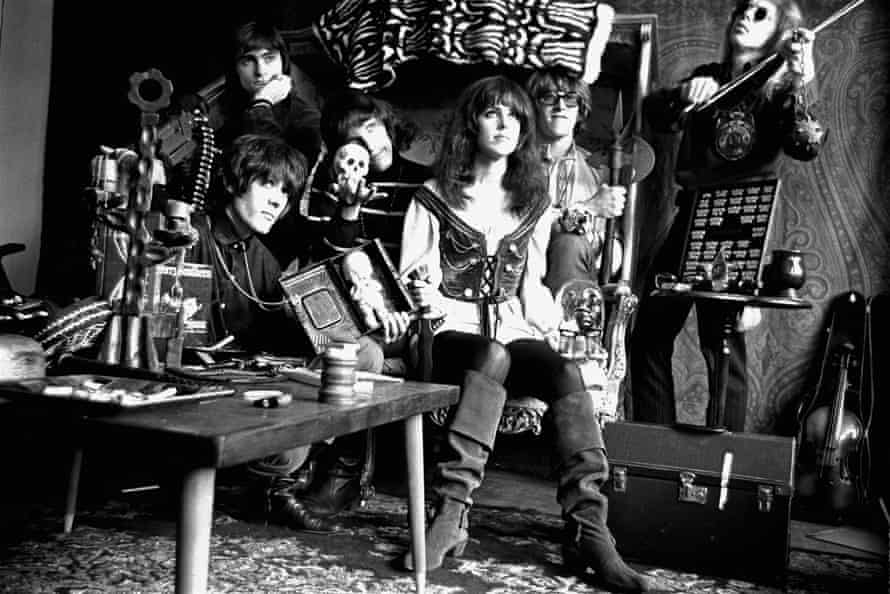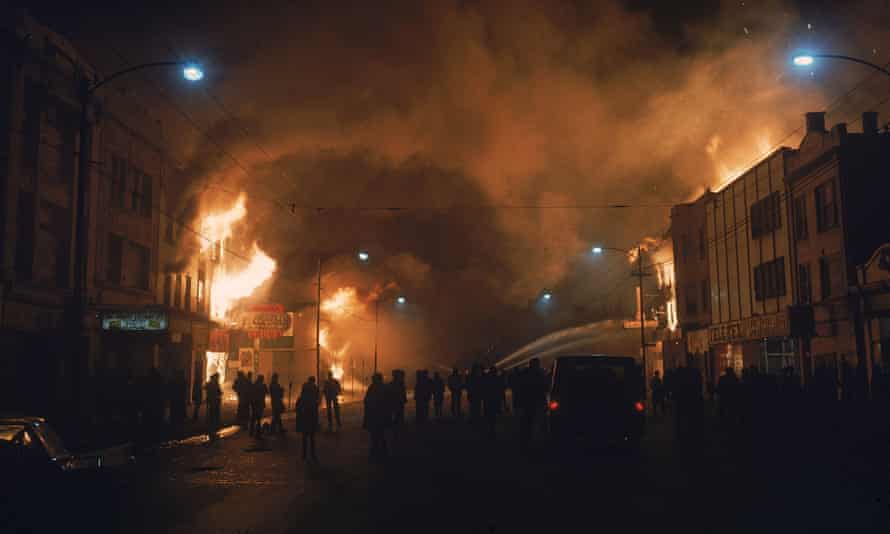How To Buy 1968 The Year That Changed America
W here were you in the 1960s? And what were you? A toddler, a grade schooler, a teenager? A young adult? Were you lot already onetime enough to form your own memories? Or were yous old plenty but in the "if you can think The Sixties you actually weren't there" category?
Of course, if you're like most people, you lot were nowhere. Yous hadn't been born nonetheless. Yous didn't exist. But wherever and whatever you were or weren't, it'due south a rubber bet that you've heard about The Sixties – quite enough, maybe. Ad nauseam, perhaps.
Or maybe not.
Technically, the sixties began on 1 January 1960 and ended on 31 December 1969. But The Sixties are another story. The Sixties are too protean to be hemmed in by calendrical niceties. The sixties may be just another decade, just The Sixties are something more than – a mood, a state of mind, a way of life, a congeries of sounds and images. The Sixties incorporate multitudes.
There is a standing theological controversy among sixtiesologists concerning when The Sixties tin can properly be said to take begun and concluded. Tuesday 8 November1960 – the day Senator John F Kennedy was elected president – has a pretty skilful claim to the first. Kennedy's campaign slogan, which appeared on every entrada poster, had been LEADERSHIP FOR THE sixty's. Out with the tiresome, conformist, priggish, crewcut, Eisenhowerish Fifties! In with the dashing, exciting, daring, sexy, slightly longer-haired, Kennedyesque Sixties!
A darker view – the view I take – sets the clock of The Sixties ticking three years later. The assassination of President Kennedy was a crack in time. Like Dominicus 7 December 1941; and like Tuesday 11 September 2001; Fri 22 November 1963 was "a appointment that volition live in infamy". And, like them, it was a day that is remembered in vivid detail past those who experienced it.
I was taking a noontime shower in my Harvard dorm room, having been as usual up till dawn getting out the college daily, the Crimson. I heard a faint, muffled radio news bulletin coming through the wall from the neighboring room. As I dried off, I turned on my own radio. I tin still run across the edge of the shower stall and the little bathroom window next to it. On the grass below, a girl was standing nether a tree, weeping. The Crimson put out an extra that afternoon, but without my assistance. It felt too much like a schoolboy stunt. Rightly or wrongly, I didn't want to play newspaperman. I didn't desire to be distracted from the communal grief all around me.
So The Sixties, in this conceit, began either in 1960 or, like Philip Larkin's sexual intercourse, in 1963. And the ending? That too has long been a subject of argue. At that place are enough of nominees, two of which may be considered the frontrunners. Like the ancestry, one is light and 1 is dark. The light one: Friday ix August 1974, the day Richard Nixon resigned the presidency, freeing the nation from a quarter-century of having had him to kicking effectually. The dark 1: Altamont. Sunday 6 December 1969. Google it. Or see the movie.
Whenever The Sixties started and ended, it is universally recognized that 1968 was the peak yr – the climactic year, a singular year, a year of events and sensations that cascaded with an intensity that was sometimes unbearable, sometimes ecstatic. In a modest style, 1968 was the kind of year that pushes history in some unforeseen, astonishing direction – a gentler little brother to 1492, 1776, 1848, 1914, 1945, and 2001.
It is possible to build a narrative around ii currents of the year's events, currents that melded and crisscrossed and fed off each other, to startling effect: the music, mostly a kaleidoscopic, wildly imaginative explosion of stone'n'roll; and the politics, mostly a politics of protest – protest confronting the Vietnam war, confronting racial injustice, and, more broadly, against what was experienced as the joyless, stultifying blandness of mainstream American life.
Those two currents, the music and the protests, done over me every bit they did over millions of others. In 1966, a year out of college and a newly minted cub reporter for Newsweek, I was lucky plenty to land in San Francisco. Something was happening there, and I plant myself in a position to blot it.

The scene, cultural and political, was quite something. A new kind of music – rooted in dejection, stone, and electronica, and supercharged past psychedelia – was drawing motley-dressed weekend crowds to a couple of repurposed old trip the light fantastic toe halls, the Fillmore Auditorium and the Avalon Ballroom. For $2.50 you could spend hours listening and dancing to bands that were nonetheless unknown back east or downwards south in LA – bands still without record contracts but with wonderful names: Jefferson Airplane, the Grateful Expressionless, Big Blood brother and the Holding Company, Quicksilver Messenger Service – often paired with iconic bluesmen like Muddied Waters and James Cotton. The walls were mesmerizingly alive with rhythmically pulsating, e'er-irresolute liquid projections. Information technology was, in the patois of the moment, heed-blowing. For the gentle dreamers that Herb Caen, the San Francisco Relate's gossip columnist, had dubbed hippies, the Fillmore and the Avalon were Carnegie Hall and the Philharmonic.
If San Francisco was the cultural capital of a new youth democracy, Berkeley was the political capital. The campus of the Academy of California was the staging surface area for demonstration subsequently demonstration. Further left, would-be revolutionaries flirted with violence. The acrimony that in 1968 would explode in the streets of Chicago was growing rapidly. And so was the reaction. A erstwhile moving picture star, Ronald Reagan, ran for governor and won, largely on a promise to bring all those spoiled, unpatriotic campus brats to heel.
Like every beau of my generation, I had to reckon with the typhoon. I was against the war, of course, but I didn't retrieve I had the stomach to go to jail over information technology. I had null desire to go to any more than schools, graduate or otherwise. I was unmarried and childless. Canada was not my state, my country was the Usa of America. I wasn't physically or mentally ill and was likewise proud to fake information technology. And I wasn't a conscientious objector. On the other hand, I didn't want to get killed either. My solution was the United states of america navy.
I got a haircut and reported to the naval base at Newport, Rhode Island, for three months of officeholder training. From there I asked to be sent to Vietnam, just information technology wasn't like information technology sounds. Unless you were a flier (like John McCain, the future senator), a Seal (like Bob Kerrey, also a time to come senator) or a member of the Riverine Force (like John Kerry, a futurity senator, presidential nominee, and secretary of state), existence a naval officer in Vietnam, especially a "public affairs" officer like me, posed very piddling physical risk. Instead, however, the navy, in its wisdom, assigned me to a desk job in lower Manhattan.
I stole away from the function whenever I could, and devoted the time to salving my conscience. I pitched in at the ramshackle headquarters of the War Resisters League. In March, subsequently Robert Kennedy entered the presidential race, I took to hanging effectually his Manhattan headquarters, doing layouts and writing headlines for the Kennedy Current, the campaign's weekly tabloid.
Every bit the yr rushed on, the pace of events grew ever more frenzied: the bloody daze of the Tet Offensive; the electoral abdication of President Lyndon Johnson; the assassination of Martin Luther Male monarch Jr and the riots that followed; the murder of Robert Kennedy; the cluttered, riotous Democratic convention in Chicago; Nixon'south hairsbreadth victory over Hubert Humphrey in November. And me? Well, at Christmastime I got the orders to Vietnam (as a "recreation officer" at the US base of operations in Da Nang) I'd hoped for ii years before. Only this time I didn't want to go. My antiwar sentiments had hardened to the point that I decided I preferred jail to further military machine service, and I announced my intention to refuse the orders.

Simply before I could achieve fame equally a martyr for peace an unexpected medical difficulty developed: I had a wisdom tooth pulled, the wound bled for days, and when I was diagnosed with a (relatively mild) form of hemophilia, the navy quickly mustered me out. I had managed to have it both means: veteran (kind of) and resister (in a way).
And what about the current president of the The states? Where was he in '68? Why safe and sound in Philadelphia, where, that June, the young Donald Trump completed his studies at the Wharton School of Business organisation. Tragically, he was unable to serve in what he now calls "our great military". He scored a total of five draft deferments: four on account of educatee condition followed by a medical disqualification for a symptomless instance of "os spurs" in the heel of one pes. Which foot? He tin't remember.
Why didn't I think of that?
In 1968 the sixties were most over, but The Sixties have never fully gone away. For me, and no doubt for many others of my vintage, information technology'due south hard to believe that half a century now separates us from that momentous, tumultuous year, and that 1968 is now equally distant in time as 1918 – the yr of the end of World War I, the consolidation of Bolshevik power in Russia, and the flu pandemic that killed 50 meg people – was in 1968. Fifty years from now, information technology'll exist 2068.
The Sixties again! I tin't look!
- This is an extract from the introduction to the 30th-anniversary edition of 1968 in America: Music, Politics, Anarchy, Counterculture, and the Shaping of a Generation by Charles Kaiser, published in the U.s.a. past Grove Press on 17 April
Source: https://www.theguardian.com/books/2018/apr/15/1968-america-hendrik-hertzberg-charles-kaiser
Posted by: martinhignisfat.blogspot.com

0 Response to "How To Buy 1968 The Year That Changed America"
Post a Comment